Ain't That Always The Way - Alan Horne After The Sound of Young Scotland 1
by Grant McPhee
published: 8 / 11 / 2022
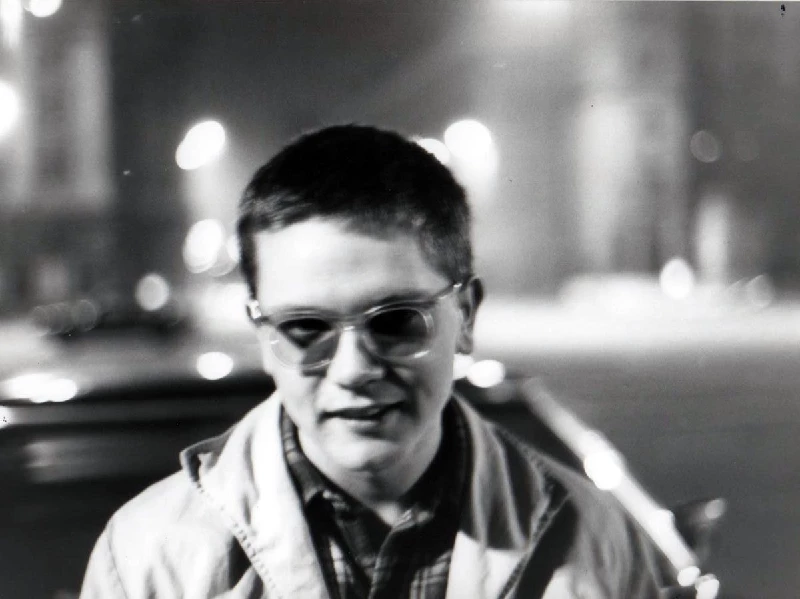
SWAMPLANDS Apres Ski Unlike 'The Sound of Young Scotland', “In the meantime....before failure” was not one of Alan Horne's more memorable slogans but it was probably the one which most accurately reflected himself. It perfectly encapsulates the missing years from the implosion of Postcard in 1982 to his resurrection as an agitator within the established music industry at the dawning of 1984, with Swamplands. To be honest, it also perfectly describes the next 40 years of Alan– multiple missing years followed by resurrection followed by more variations of failure. Not failure in an artistic sense, because in many ways what came after Postcard was the greatest music he ever released, but in commercial terms most records he released tanked. From a music business perspective Alan was a Jonah. ‘Pale Blue Eyes’, the 1984 first Swamplands single that he put out under the backing of the mighty London Records only reached No 72, his highest ever chart placing. Chart supremo, Vince Clarke's first and almost only mainstream failure was with a Paul Quinn collaboration involving Alan that barely scraped into the top 100, reaching the dizzying heights of number 99. Aside from Erasure's lacklustre 2nd single's equally unsatisfactory placing, and up until 2011 this is the lowest chart entry a Vince Clarke single has ever achieved. It brought to a crashing end a near continuous run of 6 top ten singles for Clarke. This release, ‘One Day’, while not Vince or Paul's greatest moment is still a fantastic record nonetheless, full of epic Quinn Bowie-isms and Clarke's trademark electronic bleeps and melodic pop genius. As noted, Vince Clarke was no one-hit-wonder, his previous collaborative single, featuring Feargal Sharkey had reached the UK No4. How could it have possibly have failed then? There's rarely been such a calamitous drop in chart placings for a follow-up single as ‘One Day’, especially for one this good. The answer lies, as answers often do in the small print. This Mute Records release states on its back cover that 'Paul Quinn appears courtesy of Swamplands'. Swamplands holds the answer. This is the story of why Swamplands failed. In Scottish mythology, the swamplands are haunted by the Willo-o-Wisp, most commonly translated as 'the giddy lights' – mystical and siren like illuminations that lead the lone traveller through a dangerous swamp only to find to their horror, that rather than leading them to safety, the lights unexpectedly extinguish themselves mid journey to leave the poor traveller lost and slowly sinking into the darkness. Awkward allegories of labels floundering to the allure of mainstream success aside, Swamplands was a very difficult period for Alan Horne. Bob Last, his old rival had then taken independent music far beyond what could have been imagined by either of them in 1977. To give this opportunity latitude Alan had to throw to the wind his seeming idealogical DIY convictions. To then see that first real opportunity for chart success fail must have been crushing. The failure of Swamplands is also a large part of the Paul Quinn story, the fates of both him and Alan are tied inextricably together and they can't be separated. “The worst thing that happened to Paul was meeting Alan and the worst thing that happened to Alan was meeting Paul” is how Swamplands labelmate James King, who seldom holds punches describes the relationship. There is a lot of truth in this theory because Swamplands was created first and foremost by Alan as a vehicle for Paul but this seemingly perfect union somehow only resulted in damage to both of their careers. From its inception the combination would only disappoint and appear cursed. Alan was involved with almost every release Paul made but it should be noted that Paul's only chart success was and still is without Alan's or Swamplands' involvement – ‘Breaking Point’ with Bourgie Bourgie and most successfully when he sang backing vocals on the UK No8, ‘Rip It Up’ with his old friend and fellow Postcard escapee, Edwyn Collins. The failure of Swamplands runs deeper than simple consumer led inadequacies or lack of critical interest however. It seems that some of the reasons why Alan could not make Paul a success – and ultimately Swamplands can be found within the DNA of its predecessor. Despite never having achieved mainstream chart success, Postcard Records has entered into music mythology. If Alan had never been involved in music after 1981 he had already done more than enough to claim his place in 'the story'. Postcard is, was, and will almost certainly remain one of the archetypes of Independence and punk spirit and a large, large part of this was down to Alan himself and especially what made Alan tick. What made Alan tick is the first clue in the mystery of what made Swamplands fail. The overriding desire of Postcard under Alan was to see Edwyn Collins become a fully fledged pop-star on an independent label, something Edwyn eventually managed on his own after leaving Postcard but not before first signing to a major. To Alan this was seen as selling- out but as Bob Last had begun to show, the world of DIY music labels was fast changing and major labels, seeing a new market were now happy to build successful alliances with those independents willing to compromise. Bob would describe these pacts as 'selling in'. Malcolm Ross said that Alan always believed that Postcard could reach the real charts under its own steam and for the rest of 1981 and 1982 Alan chose to remain true to this belief. Being a connoisseur of classic pop Alan would very likely have been aware of what the major label compromises of his peers actually meant – making hits. While some of the greatest songs written did not trouble the charts their sales, or lack-of, mattered greatly to major labels – when you're hot, you're hot and when you're not, you're really not. Alan would have been acutely aware of Orange Juice's initial relatively lacklustre Polydor sales and the pressures Edwyn felt which came with them. Losing his star group to a major and himself not wishing to negotiate with a label bigger than Rough Trade was how he would end Postcard. A feeling of idealogical betrayal and mistrust of the mechanisms of the major music industry would only further bleak-en Alan's view of what the mainstream actually meant as his friends, over the next two years slowly left him behind and eventually made headway into this world. Orange Juice, in 1983 were then at their most successful peak and buoyed by his good nature and contacts, Edwyn wanted to help his then struggling friend back into the record business, who by then, much like a teenage Jesus was seemingly going through his own wilderness period. Alan was not in a good shape between 1982 and 1984, and in a revealing 1990 letter to journalist Alan Laing pointedly clarified what had really happened in the span when Orange Juice left Postcard - “I was not managing OJ by now. I was against them going to Polydor for all the obvious reasons and was proven right but found little comfort in the 'told you so's....Bottom line – mental fatigue, speed psychosis etc. I didn't fight them about leaving....PS I took nothing from the Polydor deal”. Of course, this was said from the relative hindsight of 1990, around 5 years after the actual demise of Swamplands. As we know from the vantage point of 2021, despite his seeming reservations Alan did indeed make an attempt at joining his old friends by also compromising with a major label. It's sometimes forgotten that Edwyn co-ran Postcard with Alan. Edwyn also wrote the majority of songs for Orange Juice and when Edwyn left, it was no coincidence, despite Alan's later revealing of his then mental state that Postcard then effectively stopped too. It is of no further coincidence either that Edwyn too was the initial driving force for Swamplands. It was Edwyn who was now pushing Alan to re-engage with music and it was Edwyn, while impersonating him who phoned London Records to broker the deal for them to work together. This awkward dynamic between Alan and Edwyn may ultimately be the key reason as to why Swamplands was never a success. While Alan was motivated to push Postcard and Edwyn to success the first time-around it seems clear that from his then personal situation that Alan may not have had that same enthusiasm this next time. As powerful a personality as he was, Alan needed a collaborator with the same drive and musical skills as Edwyn to help make his dreams see reality. Unfortunately for Alan, Edwyn's real priority then was Orange Juice and continuing to give Polydor hits. Alan needed help. In 1984, what better way then for Alan to then create this potential new 'indie on a major' endeavour than by finding himself a 'new Edwyn' for it and with them, simply recreating that successful Postcard template? The obvious choice for Edwyn MK2 was the previously mentioned Paul Quinn, a childhood friend of Edwyn's who had been involved on the Postcard fringes with The French Impressionists and the Jazzateers. He looked great, he had an amazing voice, he'd just sang backing vocals on ‘Rip It Up’ and seemed destined for greatness. Paul was then fronting a Jazzateers project, Bourgie Bourgie, which as we will later see would lead to career floundering problems for almost all involved, not least Swamplands. This plan would appear perfect in 1984. “It's just a very important thing for me to make Paul successful on some level and make great records. With Paul I can make the records I always wanted to make with Postcard and now we've all learned a little bit along the way, we've got access to things, we've got the money and there should be nothing stopping us” In the meantime...before failure - The Swamplands deal. Alan's 1984 deal with London Records would give him his very own boutique label – Swamplands - and a budget to do and see as he pleased...providing, of course those promised hits came. If Edwyn could make it into the mainstream then surely now with Paul Quinn, someone just as handsome and with a more conventional voice under Alan's Svengali guidance - and with the financial backing of a serious major label would mean real chart success? And what better way to recreate Postcard than having the famous Postcard kitten grow up to become a panther, fiercely holding out its claws to state your intention? And if things didn't work out, Edwyn would be there to lend a hand anyway. A lot can change in a short time in the music industry however. Unfortunately, at the dawn of this resurrection of Alan, Orange Juice's fortunes would dramatically crumble in the first year that Swamplands came into existence. Despite Edwyn's continued aid through helping set the label up, writing for Paul and also occasionally performing with him, by 1984 Edwyn was now fighting for his own career as each new OJ release achieved lower and lower chart placings. 1984 would not be the best starting position for Alan embarking on a first time venture into major label business – despite a genuine desire to do what he could to make Paul famous there were hints of an underlying fragility and wavering sense of enthusiasm from Alan, as well as Edwyn's focus being shifted to fight to remain a star himself, on a rival record label who had not been enamoured by Edwyn's involvement with Swamplands when he should have been working for them. As we know, the first Swamplands release – that epic cover of ‘Pale Blue Eyes’ credited to Edwyn and Paul was a huge failure, for a major label anyway and also for Edwyn personally. From this disappointment it seems Edwyn's Swamplands involvement appears to have withdrawn a little. Once again, Alan again found himself alone on the swamplands. And worse for Alan, despite Paul Quinn having fantastic charisma and a voice to match it was becoming clear that Paul was not his Edwyn MK2. Postcard had been an almost instant success – in independent terms anyway but everything for Alan after was not. The world he was now operating in required a different set of rules and far more tenacity, something that was beginning to deplete as the public seemed to ignore each of his new Swamplands endeavours. The panther on the label was beginning to seem like the Postcard pussycat in the world of big business. Unlike Edwyn, Paul had not jumped immediately from reading the NME to being on its front cover as a result of Alan's press lobbying or supply of witty slogans. It should also not be forgotten that Edwyn's own force of will, looks and charm further helped propel himself to that initial press success. The forceful approach from Alan just did not work for major record labels and from the disparity of what was promised for Swamplands to what was actually delivered made it look like Alan was not trying as hard as he could. Overall, what Alan was discovering was that the real world of the music business could not be conducted from a wardrobe and by this time, seeming desperation for Paul to succeed may have already been creeping in. Alan seemed to be tiring which was not surprising as his quest to make Paul a star had actually begun earlier, in Postcard's twilight years and further clues as to why Swamplands failed can be found there. Alan's 1982-84 wilderness years were not solely spent in a darkened room. The seeds of his (and Paul's) journey to Swamplands and its public apathy were sown a year prior to the failure of Pale Blue Eyes. Alan had managed Paul in the Jazzateers as they evolved into Bourgie Bourgie MK1. If the Jazzateers story is confusing – and it is - then it pales into comparison with record label contracts involving poor Paul and how they and other seemingly unwise or rash decisions would later impact on him and Swamplands. Alan, while managing this first iteration of Bourgie Bourgie in early 1983, in a surprising but characteristically consequence filled move suddenly resigned that management role and abruptly took Paul away with him as he believed he could gain Paul a solo deal. It is not recorded as to what brought about this change of tack but what is most surprising is that this very sudden and bold move was seemingly contradictory to Alan's apparent belief of DIY autonomy. To everyone, Alan had suddenly decided that he could sign Paul to a major label. They took themselves away and recorded a Jazzateers penned song called ‘I Gave You Love’ as a calling card which gained zero record label interest and is still unreleased to this day. From those who have heard the recording this is not necessarily a bad decision. This sudden intervention of Alan's certainly did feel like a bad decision though, certainly the inconsistency of maintaining an independent aesthetic to suddenly rebrand your future star as an idol to teenage girls on a major was certainly at odds with Postcard, and even Swamplands. Shortly after Alan's rash interruption, the regrouped Bourgie Bourgie, now back again as the Jazzateers were busying themselves recording their debut album for Rough Trade. To their surprise, a now very physically hungry Paul, minus Alan contacted them out of the blue asking if he could rejoin, to which they amazingly agreed despite their heavy reservations regarding his earlier surprise exit. They let him sing backing vocals on the album and after the equally fantastic sounding Graham Skinner left on completion of the album to form White Savages, Paul would soon fill their singer vacancy again. This reestablishment, as Bourgie Bourgie MK2 via new manager Pat Bellis would entice MCA to sign them to a major deal, with their debut single ‘Breaking Point’ being released in early 1984 and reaching a respectable No.48 in the real charts, Paul's second chart success sans Alan. The relative success of this single would lead to MCA funding the recording of a full album, to be recorded in an upmarket studio in Bavaria. This would be no cheap endeavour. It was after all at the height of 80s production bombast and MCA had heavily invested in Bourgie Bourgie. As is the way of this story, what should have been a success can again be summed up by the slogan 'in the meantime...before failure'. The Bourgie Bourgie album was not to be. This intermission into Alan's wilderness years now takes us back to where we left, with the beginnings of Swamplands and further context as to why it didn't succeed. The potential success for Bourgie Bourgie was scuppered by Alan once again seemingly appearing from nowhere with a bag full of Swamplands cash, promising to finally make Paul a star. Rather than stay with Bourgie, who as you recall had only just had their hit single, Paul was convinced enough by what Alan told him to leave everything behind. Whatever talents Alan has – and he has many – the power of persuasion must surely be his greatest skill. Off they now both went to record Pale Blue Eyes with Edwyn, the astounding Velvet Underground cover. We can again see how the failure of the first Swamplands release must have hit Alan hard. It also further highlights that the inevitable exploding Catherine wheel which would end Swamplands had actually been ignited on day 1: Of course, MCA were not happy with Paul suddenly appearing on a London release as he was already signed with Bourgie Bourgie to MCA. In the big world of music business contracts have consequences. And Polydor were clearly not thrilled either to have Edwyn Collins appear so prominently on a London Records release, no matter how heavily it was disguised. They may have appeared to be special guest appearances but in realty this very much looked like artists were being signed to multiple rival major labels at the same time. This behaviour could be archly tutted at in a Glasgow tenement but certainly not accepted in international record boardrooms. All fingers were now pointing at Alan Horne. The lack of any hits would only make matters worse. With all of Alan's attention being diverted to Paul and his new found legalities, the new roster of Swamplands acts floundered. James King and the Lonewolves, despite being one of Scotland's greatest acts, had previously scared away major label interest due to their formidable reputation as troublemakers. What chance would they now have within company meetings without Alan acting as their shock absorber? James King described his experience - 'It was always Paul, Paul, Paul. What about us?' Similarly, WIN would unfurl and their fantastic promise go unrewarded. Davy Henderson complained in ‘Big Gold Dream’ that London would blame the lack of success from ‘You've Got the Power’ on his inability to sing his own song. The teenagers from an Edinburgh council estate were left effectively on their own to negotiate with middle aged, out of touch corporate management. Bob Last recalled, 'maybe they just did not have the right kind of business resilience and acumen to deal with a major label'. “Alan just disappeared...He just kind of evaporated, as he does!” - Davy Henderson. The exploding Catherine wheel had finally burned out... The Patti Palladin and Johnny Thunders single which Alan recorded eventually ended up being released elsewhere due to confusion over whether they even had a contract with Swamplands, far less than whether they believed they were recording an album. The Memphis album disintegrated with only backing tracks being recorded. A similar fate befell a proposed album produced by John Cale for the Lonewolves which also went unreleased. In a bitter irony, what remained of Swamplands was locked away in a small London Records cabinet for 30 years, not too unlike Alan Horne's famous Glasgow wardrobe. Unlike Alan's wardrobe, which is seemingly opened and closed repeatedly in a multitude of modern documentary films the Swamplands locker still shamefully remains mostly locked away to this day. Of course, Swamplands was a disaster which is a tragedy made worse as the discography is often of an equal to Postcard. Like Postcard, Swamplands lasted for 2 years but sadly never shone as brightly in the public eye. “The story of Swamplands is Alan. It wasn't about us, it wasn't about Win, it wasn't about Paul Quinn or anyone else. As far as the weeklies were concerned, the story was Alan Horne” The fallout from Alan's attempt to subvert from within was even more damaging than the end of Postcard. Paul and Alan, tied up in tussles would not release another record for a further 7 years......
Band Links:-
https://www.whiterabbitbooks.co.uk/titles/douglas-macintyre/hungry-beaPlay in YouTube:-
Picture Gallery:-

Alan Horne
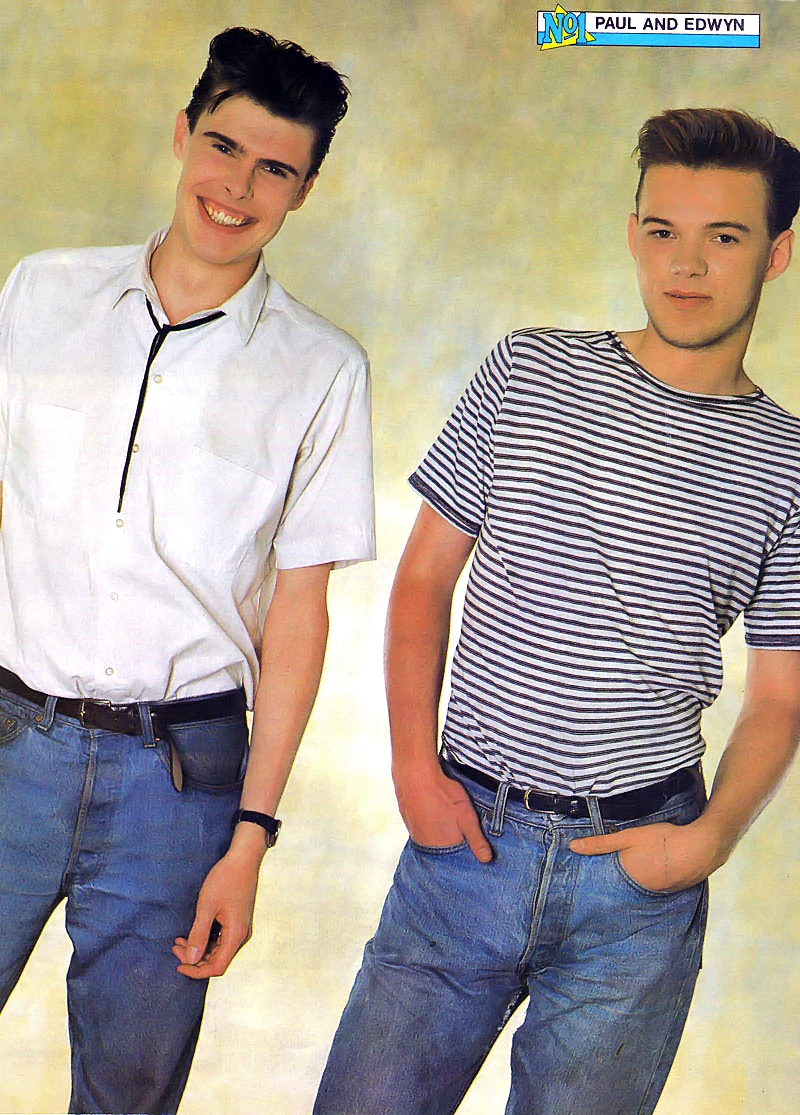
Paul Quinn and Edwyn Collins
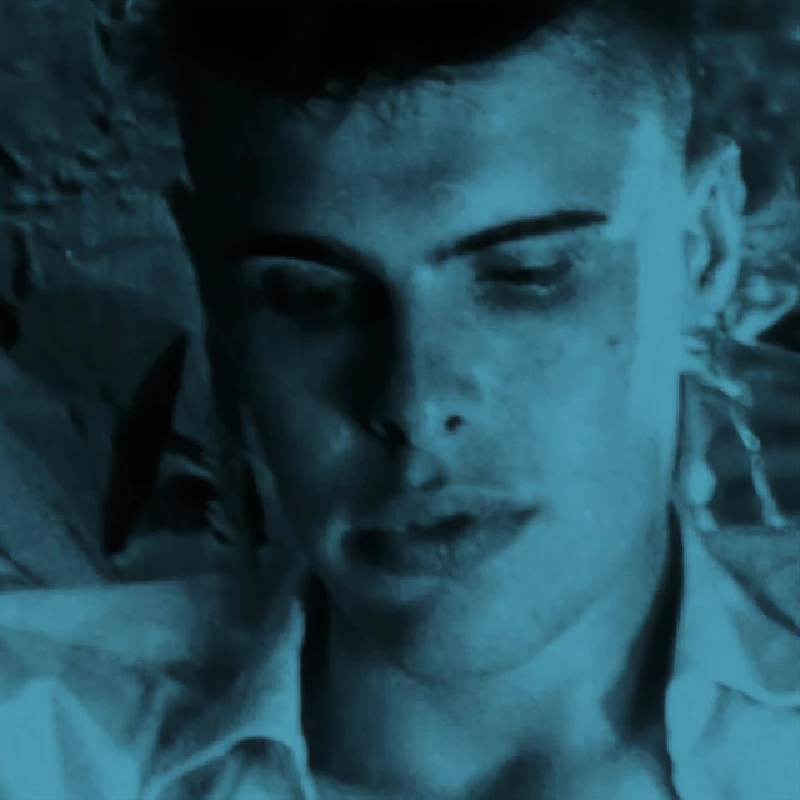
Paul Quinn
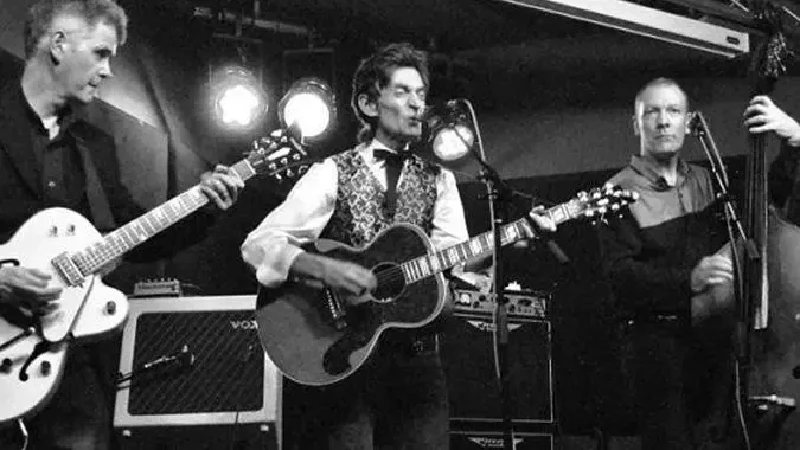
James King and the Lone Wolves
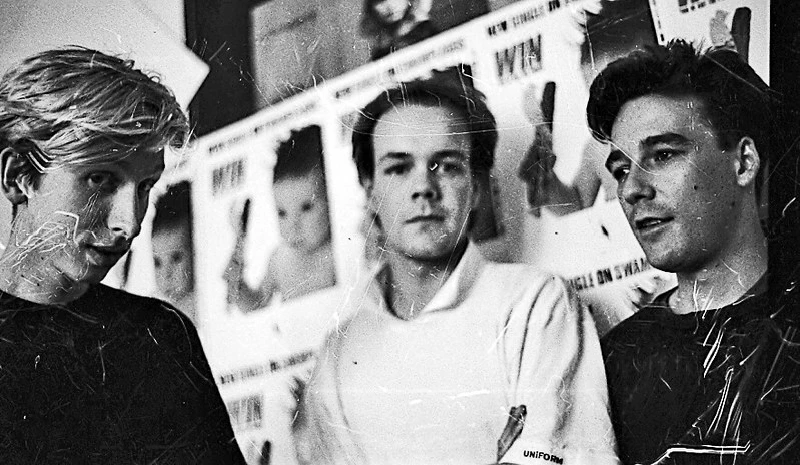
WIN
Visitor Comments:- |
| 3258 Posted By: Tom Rafferty, Glasgow on 17 Oct 2022 |
|
Interesting article.
That photo is not James King & The Lonewolves - it is the Veloninos.
|
intro
In the first part of a two-part feature on Alan Horne's career after the implosion of his influential record label Postcard Records, 'Big Gold Dream' director and 'Hungry Beat' co-author Grant McPhee looks at his short-lived follow-up label Swamplands.
profiles |
|
Alan Horne After The Sound of Young Scotland 2 (2022) |
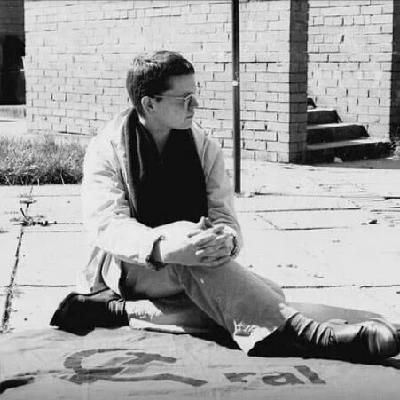
|
| In the second part of his feature on the latter career of indie record label owner Alan Horne, Grant McPhee looks at his resurrection of Postcard Records twice, firstly in the early 1990s and again in 2021 |
most viewed articles
current edition
Peter Doherty - Blackheath Halls, Blackheath and Palace Halls, Watford, 18/3/2025 and 21/3/2025Armory Show - Interview with Richard Jobson
Liz Mitchell - Interview
Lauren Mayberry - Photoscapes
Deb Googe and Cara Tivey - Interview
Max Bianco and the BlueHearts - Troubadour, London, 29/3/2025
Garfunkel and Garfunkel Jr. - Interview
Sukie Smith - Interview
Maarten Schiethart - Vinyl Stories
Clive Langer - Interview
previous editions
Heavenly - P.U.N.K. Girl EPBoomtown Rats - Ten Songs That Made Me Love....
Trudie Myerscough-Harris - Interview
Doris Brendel - Interview
Oasis - Oasis, Earl's Court, London, 1995
Beautiful South - Ten Songs That Made Me Love...
Dwina Gibb - Interview
Pulp - Ten Songs That Made Me Love...
Kay Russell - Interview with Kay Russell
Sound - Interview with Bi Marshall Part 1
most viewed reviews
current edition
Davey Woodward - Mumbo in the JumboNigel Stonier - Wolf Notes
Wings - Venus and Mars
Kate Daisy Grant and Nick Pynn - Songs For The Trees
Only Child - Holy Ghosts
Neil Campbell - The Turnaround
Philip Jeays - Victoria
Darkness - Dreams On Toast
Suzanne Vega - Flying With Angels
Charles Ellsworth - Cosmic Cannon Fodder
Pennyblackmusic Regular Contributors
Adrian Janes
Amanda J. Window
Andrew Twambley
Anthony Dhanendran
Benjamin Howarth
Cila Warncke
Daniel Cressey
Darren Aston
Dastardly
Dave Goodwin
Denzil Watson
Dominic B. Simpson
Eoghan Lyng
Fiona Hutchings
Harry Sherriff
Helen Tipping
Jamie Rowland
John Clarkson
Julie Cruickshank
Kimberly Bright
Lisa Torem
Maarten Schiethart